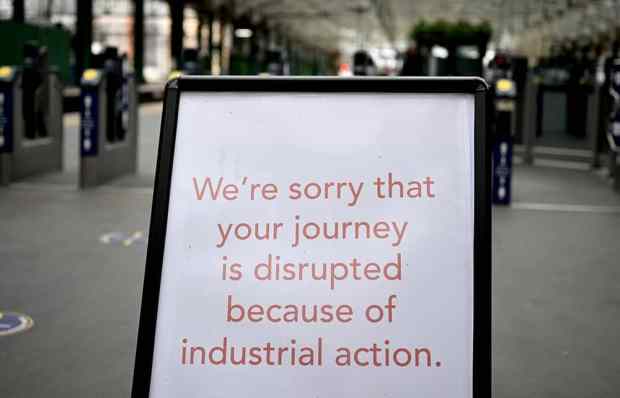We don’t hear enough about Network Rail these days. By that I mean that the entity recently described by the Sunday Times as ‘synonymous with incompetence and delays’ doesn’t receive anything like the abuse it deserves for failing to provide the infrastructure essential for a 21st-century railway. I refer you to the Crossrail project, in which the inability of new trains to connect with old Network Rail signalling systems is one reason for the delayed opening that has become a major national embarrassment. I invite you to observe LNER’s expensive new fleet of Azuma bullet trains that were due to launch in December but delayed by incompatibility with Network Rail signals. And of course if you’re a London commuter, you’ll have your own observation of the frequency with which track and signal failures ruin your day.
But I’ll bet you don’t know who controls Network Rail, or whether it sits in the public or private sector or (as Labour ministers pretended when they confiscated its assets from Railtrack shareholders in 2002) somewhere in between. The answer is that Labour’s sham was unwound several years ago, so that Network Rail is now wholly nationalised, its debts sitting on the Treasury balance sheet and its sole shareholder Secretary of State for Transport Chris Grayling. One consequence of this change is that, when £1.5 billion-worth of Network Rail’s property was sold to private equity earlier this year (to the distress of railway-arch businesses whose rents shot up in consequence), the Treasury snaffled most of the proceeds as a contribution to deficit reduction, rather than allowing them to be reinvested in overdue rail upgrades.
Why does this matter, apart from the irritation for rail passengers? Because John McDonnell has plans if he comes to power, as well he might, to nationalise utilities ranging from Thames Water to National Grid, with sub-market compensation for shareholders, and to take train franchises into public hands — and voter opinion on this issue is reportedly 80 per cent behind him. But voters should take a close look at the one example we have of a large-scale nationalised utility, namely the unfit-for-purpose, half-hidden fiasco that is Network Rail.
Fallen free-thinker
When the fund manager Neil Woodford was interviewed for The Spectator by Jonathan Davis in 2015, not long after he left Invesco to set up his own firm, I headlined the article ‘The world is a very difficult place’. That was Woodford’s summation of global economic tides at the time, but it’s also a fair comment on his own subsequent experience: as his funds’ performance failed to live up to their promise, investors gradually fled, causing his flagship equity income fund to shrink from £10 billion in 2017 to £3.7 billion this week, when withdrawals were frozen.
Woodford’s reputation as the investment scene’s most potent free-thinker, nurtured over 30 years, is in tatters. And that’s a shame, because he’s also one of the few mainstream London money men who has been willing to put a slice of his funds into smaller, early stage and even unlisted businesses. One such was Oxford Sciences Innovation, a university spin-out in which (under pressure to find cash for redemptions) he recently sold his £55 million stake.
‘It’s the failure of my industry to understand the needs of the science and innovation community, or even to want to participate in it,’ he told us in 2015, ‘that is the single biggest factor behind our failure as a country to translate the great science we have into commercial success.’ The fall of Woodford is, in that sense, a much bigger loss to UK investment than the implosion of one overhyped fund.
Trumpets and cinnamon buns
The entry deadline for our 2019 ‘Economic Disruptor of the Year Awards’ is this weekend but there’s still time to fill in the form at www.spectator.co.uk/disruptor and join the galaxy of innovative ventures that have already put their names forward. I’m looking forward to meeting some of the entrepreneurs behind them during the judging process — and I’m delighted to report that one of our 2018 winners, Warwick Music Group, maker of the celebrated low-cost plastic trombone, has just received a Queen’s Award for Enterprise.
On a related theme, I’m also pleased to have discovered the Green Angel Syndicate, which exemplifies what I regard as the right pragmatic answer to the ‘climate emergency’ question with which so many of you have recently made mischief. The syndicate is a group of 120 private investors who have together put £5 million into early-stage ventures in various aspects of ‘cleantech’. Their portfolio includes Powervault, ‘an intelligent battery system for the modern smart home, designed to maximise energy efficiency’; and Swytch, which converts conventional bicycles into electric bikes, encouraging commuters to leave their cars at home. Director David Sheridan says the syndicate’s aim is to have ‘fun and excitement’ while picking green winners. If we can all do that, I’d say the battle’s almost won.
Lastly, in this trot around the disruptor track, a tribute to a start-up I described here in 2007 as ‘a lesson to would-be entrepreneurs that if you really pay attention to the quality of the product, success will follow, however entrenched the competition.’ This was a tiny bakery called Cinnamon Twist: it was so good that folk who muttered that we had no need for a fancy patisserie when plenty of pies were already available in our Yorkshire town of Helmsley were soon found ‘daily barging each other like bullocks’ to buy beautiful bread and pastries from its charming Polish sales girl. Now, hardworking husband-and-wife bakers Mark and Jillie Lazenby have decided to ease back, shut up shop and do something different. How we shall miss them. But it’s a reminder that nothing’s permanent in the business world — and that the thrill is always seeing who’ll be next to shake up the marketplace.
Got something to add? Join the discussion and comment below.
Get 10 issues for just $10
Subscribe to The Spectator Australia today for the next 10 magazine issues, plus full online access, for just $10.
You might disagree with half of it, but you’ll enjoy reading all of it. Try your first month for free, then just $2 a week for the remainder of your first year.















Comments
Don't miss out
Join the conversation with other Spectator Australia readers. Subscribe to leave a comment.
SUBSCRIBEAlready a subscriber? Log in